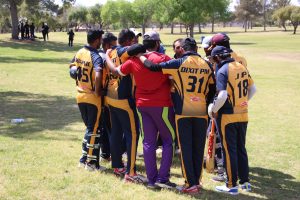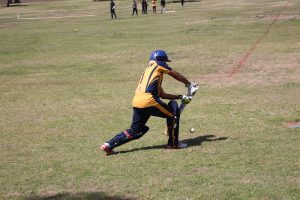- Slug: Sports-Arizona Cricket Participation. About 1,300 words
- Photos available.
By Alec Henden
Cronkite News
SCOTTSDALE – When Mit Rohit immigrated to the United States from India, it was more of an adjusted than expected. He was 13 and struggling to learn the language.
He left everything he knew for a foreign place with a different culture, a place that didn’t share a passion for his favorite sport.
Cricket.
That changed when Rohit began college at Arizona State and found people who shared his interest. In the heart of baseball country, a group of passionate cricket fans set up their playing surfaces at various parks throughout the Phoenix metropolitan area.
A sport best known for its dominance in India and Pakistan is finding a foothold in the state. Membership in the Arizona Cricket Association has grown steadily since the organization began in 1996, cofounder Paul Ward said.
“We even have teams here in Yuma,” Ward said about his current residence.
The association’s Web site shows 20 registred clubs, with many in Chandler and Scottsdale and even a pair in Tucson.
Many of the players are tuned in to the six-week International Cricket Council World Cup, a 10-team event held in England and Wales this year that culminates with a final on July 14. The sport has worldwide interest. The debut match of the World Cup between England and South African, had a television audience reach of 114 million, the India Times reported.
For those unfamiliar with the sport, it can be difficult to comprehend at first. Like baseball, it features a ball and wooden bat, the latter with a cylinder. The game features two teams of 11 players, with each team alternating batting and fielding. The bowler (equivalent to a pitcher) tries to knock down the bail (two small sticks) atop the wicket. A batsman tries to prevent the bowler from hitting the wicket by hitting the ball.
Playing cricket in the Phoenix area isn’t always a smooth process. On a recent day ahead of a scheduled 1 p.m. match, the opposing team was late with the pitch used as the playing ”field.” It’s a large portable wood surface where the action occurs and must be provided by the home team.
“The team we’re playing today is new and inexperienced,” Rohit said. “We’re usually more organized than this.”
As members of the Arizona Cricket Association, the Falcons set up shop at Sandpiper Park in Scottsdale and travel throughout the greater Phoenix area for matches. The ACA isn’t too well-known among the sports scene in Arizona, but unlike most leagues, it’s among the most inclusive.
The 20 teams in the ACA are able to navigate and move through two divisions, with participants ranging from college students to middle-aged men participating in the league.
One common misconception about the sport is the length of the matches. The style of play utilized in the ACA is the T20 (Twenty20) game play. Under these rules, each team bats through its lineup one time each and the winner is determined based on who scores the most runs in that one inning.
“They think (cricket matches) go for days, but it doesn’t,” Rohit said with a chuckle. “There are different formats of the game and the one we’re playing right now typically gets done in about three hours.”
What stands out is those who participate in the league. It’s predominantly young men who are from countries in Southeast Asia, or are of that descent. Another large group of participants are Arizona State students who came to a new country and culture seeking something familiar.
Comparing cricket to other prominent American sports isn’t an easy task. The major sports in the United States are typically played throughout the high school level and are funded through various channels. Rohit knows the sport could hold a place in the country, but it needs a linchpin to support its rise.
“In India we play through middle school and high school, like they play baseball here,” Rohit said. “We need to have some kind of recognition in the schools.”
Cricket, like baseball, requires a great deal of space to field a match. Although the greater Phoenix area does have plenty of parks, it’s not always easy to regularly secure a place to play. Similarly to many other sports, it also costs a great deal of money to fund the necessary equipment and the all-important pitch where the action takes place.
For Rohit’s teammate, Harsh Mistry, cricket is a way for him to bring a taste of home to a foreign place. Moving to the Phoenix area in 2013, he struggled to find people with similar life experiences but was glad to be able to play the sport he loves again.
“Coming to Arizona, it took me six months to settle down and then I found some players playing here (at Sandpiper Park),” Mistry said. “After that it kept growing from softball cricket first now to playing with the hardball.”
For one of the newer players on the Falcons, all-rounder (someone skilled at batting and bowling) Saivenkat Talluri appreciates his older teammates helping him. He first arrived in Arizona to study at ASU without previously living outside his native India.
“During my freshman year I didn’t even think there was cricket in Arizona,” Talluri said. “Then later in my sophomore year I found out there was a huge league happening in Arizona.”
Talluri was initially drawn to ASU due to the W.P. Carey School of Business and loved the idea of remaining in a warm climate.
Because of the intense heat, most matches in Arizona stop during the summer. But that doesn’t keep the participants from playing the game they love just because of the extreme temperatures.
“We usually go to nets and practice,” Talluri said about a set-up similar to an indoor batting cage, “and then we have some evening tournaments where we play under the floodlights to keep us in shape.”
Although the vast majority of cricket participants are immigrants from either India or Pakistan, there are notable exceptions.
For Remy Gaudin, vice captain of the Arizona Tigers in Chandler, cricket was always an intriguing option. A native of Louisiana, he played baseball in high school but was unsatisfied with the sport and sought out something different.
“I see cricket for the first time and I go, ‘What is this sport?’” Gaudin said. “I had to go look up the laws of cricket, and yes, they are called laws. Once you start to watch the matches and get into the rhythm of the sport, you find that’s kind of baseball and chess mixed together.”
Gaudin is unlike most of his teammates and opponents in another way. In his early 30s, he’s a third-grade teacher playing against mostly college-aged men. But as an educator, he loves to teach those who want to learn more about his favorite sport.
As cricket continues to gain traction in the United States, the key remaining factor will be whether or not a professional league could develop and thrive in the huge existing sports culture.
In a Forbes piece highlighting the potential for an American professional cricket league, it estimated that the sport has roughly 20 million fans in the United States. It suggested that a professional Twenty20 domestic league here could launch by 2021 after USA Cricket announced a request for proposals in a bid to establish its own competition.
Because baseball is quick to receive criticism for it’s length of contests which could drive away viewership, pace of play is something that will be looked at.
“There’s a movement internationally to try and make the sport quicker,” Gaudin said. “We want it to be a fast sport. We want it to be action packed and it can become that thing.”
No matter the current state of the sport internationally, it’s doing well in Arizona. It’s played in parks every weekend across the greater Phoenix area, and club members are excited to teach those unfamiliar with the game.
“Coming out here and seeing this big immigrant population that all support one another and this is one of the ways they do it, it’s genius,” Gaudin said. “As a teacher that’s what I live for.”
Subscribe to Cronkite News on YouTube.
For more stories from Cronkite News, visit cronkitenews.azpbs.org.


